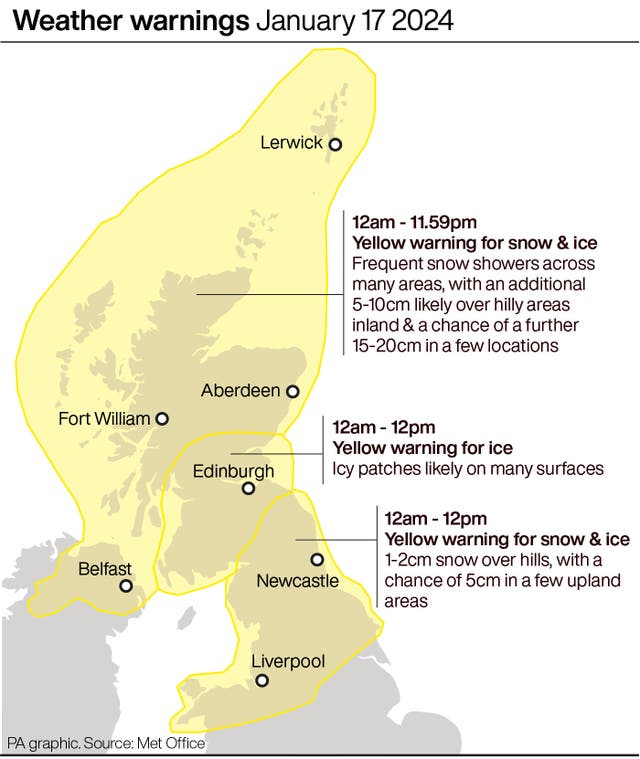
Scotland shivered through another cold night on Tuesday with some areas approaching near record-low temperatures.
According to provisional recordings by the Met Office, the mercury fell to as low -14 oC in Dalwhinnie in the Scottish Highlands.
The record lows was the coldest night recorded since 2019, and the second night in a row temperatues had plunged in the village.
The second coldest temperature was recorded at minus 13C in Glen Ogle, central Scotland, while minus 11C was recorded at Tulloch Bridge in the Highlands.
Forecasters had predicted some snow covered parts of Scotland could reach minus 15C overnight, which would have been the coldest January night for 14 years.
The last time temperatures dropped that low was in January 2010, when minus 22.3C was recorded.
🌨️A very cold start in the north with snow showers for northern Scotland and Northern Ireland ⚠️
☁️Cloudier in the south at first with the chance of some rain, sleet or snow fringing the southern coasts
🌤️Elsewhere, cold and largely dry with plenty of winter sunshine pic.twitter.com/nfKGow8YUZ
— Met Office (@metoffice) January 16, 2024
Tuesday night did mark the coldest night this winter so far, beating the minus 12.5C daily minimum temperature recorded at Altnaharra in the Scottish Highlands on December 3.
Freezing temperatures and snow will continue for much of Britain this week because of cold Arctic air before “potentially disruptive” stormy weather lands over the weekend.
More than 100 schools were closed on Tuesday in Aberdeenshire, the Highlands and Shetland.
READ MORE | Scotland warned to brace for snow as cold weather alert extended
Yellow weather warnings for snow and ice are in place across Scotland until Thursday, when more mild temperatures are forecast along with wind and rain.
More than 40cm of snow could be seen on high ground in north-west Scotland by the end of Friday as it continues to build up over the coming days, the Met Office said.
Meanwhile, lower ground in the north-west could see between five and 10cm of snow by the end of the working week.
A “cold plunge of Arctic air” has moved south across the whole country over the past few days, making it 5C to 6C lower than usual for this time of year, the Met Office said.
A Met Office spokeswoman said the low temperatures are also due to how long the cold snap has lasted.
She said: “It’s due to the prolonged nature of this cold spell, it will have been lasting for quite a few days.
 Snow was blanketed the north of Scotland (Image: Peter Jolly)
Snow was blanketed the north of Scotland (Image: Peter Jolly)
“A build up of snow, as well, just allows for the temperatures to get colder and colder and we don’t often see a cold spell last three to five days.
“The air is coming directly from the Arctic, so it is exceptionally cold air.
“It’s staying cold until Friday, and then looking further ahead into the weekend we’ve got some deep areas of low pressure pushing in, so a big change in weather type, and we could see some stormy conditions by the end of the week.
“The cold isn’t lasting right to the end of the week, but we have a very different type of potentially-disruptive weather arriving.”
The weather is forecast to turn stormy on Sunday, she added.
 (PA Graphics)
(PA Graphics)
Yellow weather warnings for snow and ice are in place across Scotland, much of northern England and parts of North Wales until Thursday, then more mild temperatures are forecast along with wind and rain.
More than 40cm of snow could be seen on high ground in north-west Scotland by the end of Friday as it continues to build up over the coming days, the Met Office added.
Meanwhile, lower ground in north-west Scotland could see between five and 10cm of snow by the end of the working week.
 Snow ploughs have been pressed into service (Image: Peter Jolly)
Snow ploughs have been pressed into service (Image: Peter Jolly)
The Met Office said on Tuesday: “There is a system skirting the south of the UK tonight and on Wednesday. This could bring a few snow flurries to the far south with a small chance of pushing slightly further north to bring more snow to southern counties.”
It said it is reviewing the situation and any new warnings could be issued at short notice.
The weekend will be milder, but westerly weather will bring wind and rain – and the potential for more weather warnings as the snow melts.
 The winter weather has made it tough for motorists (Image: PA)
The winter weather has made it tough for motorists (Image: PA)
National Rail warned the wintry weather could affect train journeys all week, with services between Edinburgh/ Glasgow Queen Street and Inverness running to an altered schedule on Wednesday.
ScotRail said a normal service is expected to run on Wednesday, bar a handful of changes on the Highland Mainline.




Comments: Our rules
We want our comments to be a lively and valuable part of our community - a place where readers can debate and engage with the most important local issues. The ability to comment on our stories is a privilege, not a right, however, and that privilege may be withdrawn if it is abused or misused.
Please report any comments that break our rules.
Read the rules here